Opera blocks Ad Blockers on Search Page results now! Fix Inside
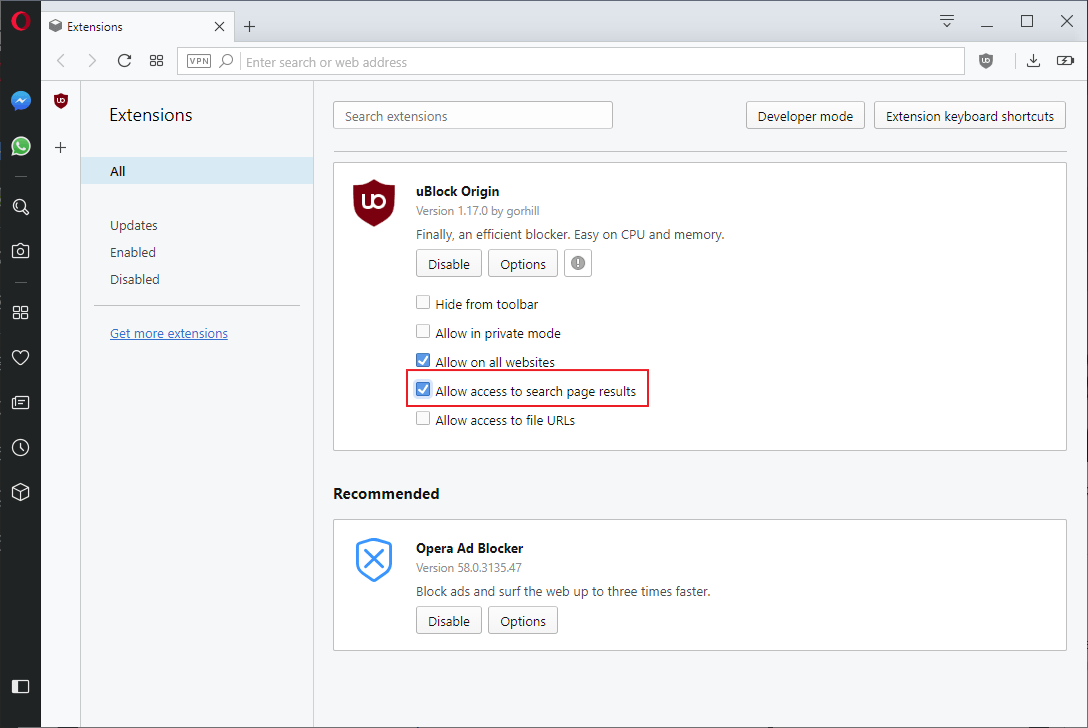
Opera users who run any recent version of the web browser -- Stable, Beta or Developer -- and either the native ad blocker or a browser extension that blocks advertisement, may have noticed that ads are no longer blocked by either solution on search results pages.
Opera users with content blockers enabled may notice that advertisement is displayed as if no content blocker was enabled in the browser on search results page.
Opera made no mention of the change in recent Opera changelogs. Developers find information about it on Opera's Dev website:
Opera implements an additional privacy protection mechanism. By default, extensions are not allowed to access and manipulate search results provided by most built-in engines.
Privacy is certainly affected by the change and while the feature may improve privacy under certain circumstances, it reduces privacy at the same time for users with content blockers.
Opera users who use content blockers need to allow extensions to access search results.
Load opera://extensions in the browser's address bar to get started. Opera displays all installed extensions and some preferences for each, e.g. to allow them to run in private mode or access all websites.

Find "Allow access to search page results" and check the box. The extension is allowed to interact with search page results once you make the change.
Opera's Native Ad Blocker works a bit different in this regard. Activate the options link on the opera://extensions page or load opera://settings/adBlocker directly.
Select the "Manage exceptions" link and remove any site listed there so that the ad blocker may block advertisement on these sites. You find sites like Google or Facebook on the list, and need to click on the menu icon and select remove from the menu that opens.
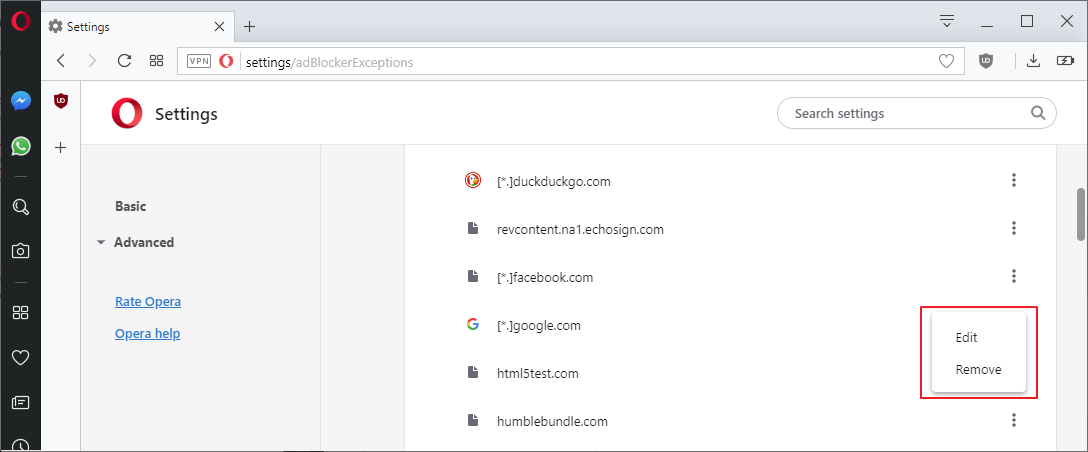
The change is active only in Opera; it is not part of Chromium, Google Chrome, Brave, Vivaldi, or other Chrome-based browsers.
Closing Words
Opera Software faces a challenge that is very similar to that of Mozilla: the balancing act between improving user privacy on the Internet and being dependent on deals with search engine operating companies such as Google.
Google and other search engine operators pay Mozilla, Opera and other browser companies for the integration of search engines in those browsers, and especially for the privilege of selection of the default search engine
Companies earn money from these deals when users use these search engines and view or interact with ads, and other monetized content or other activity.
The deal is probably the core reason why Mozilla or Opera have not integrated or enabled a full content blocker in their browsers. (via Deskmodder and Techdows)



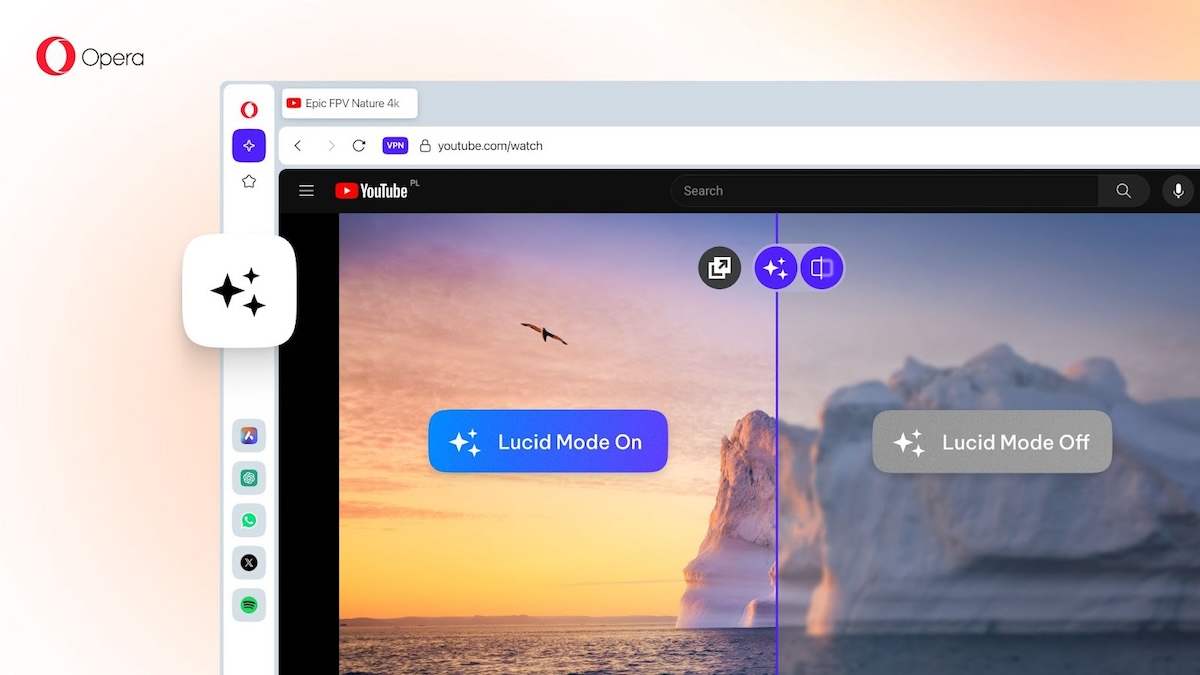

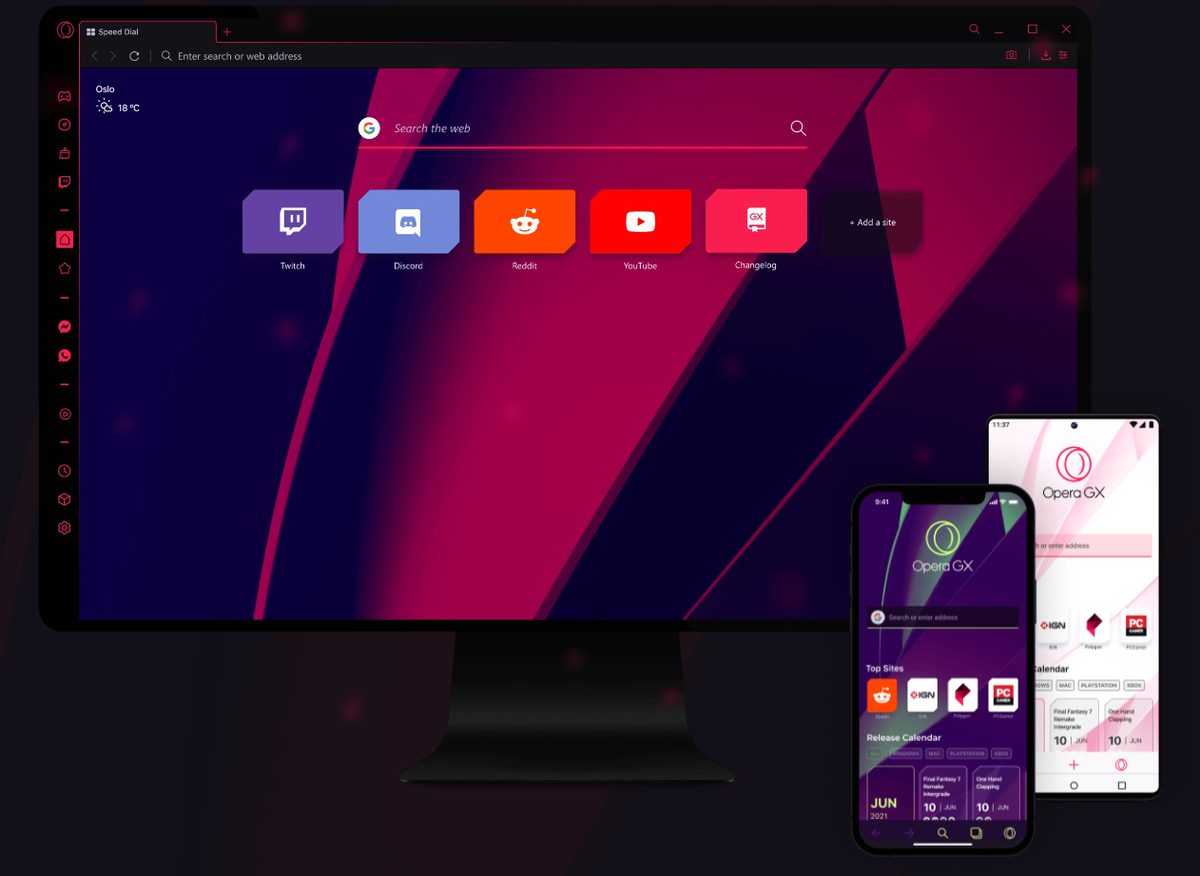
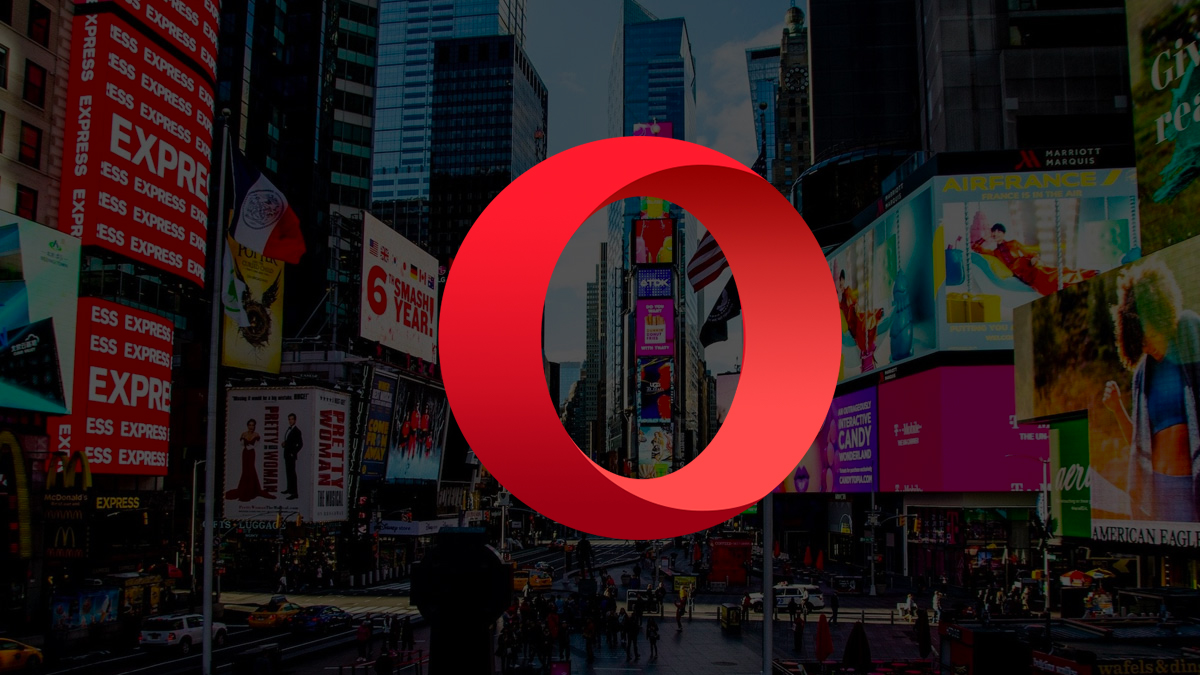
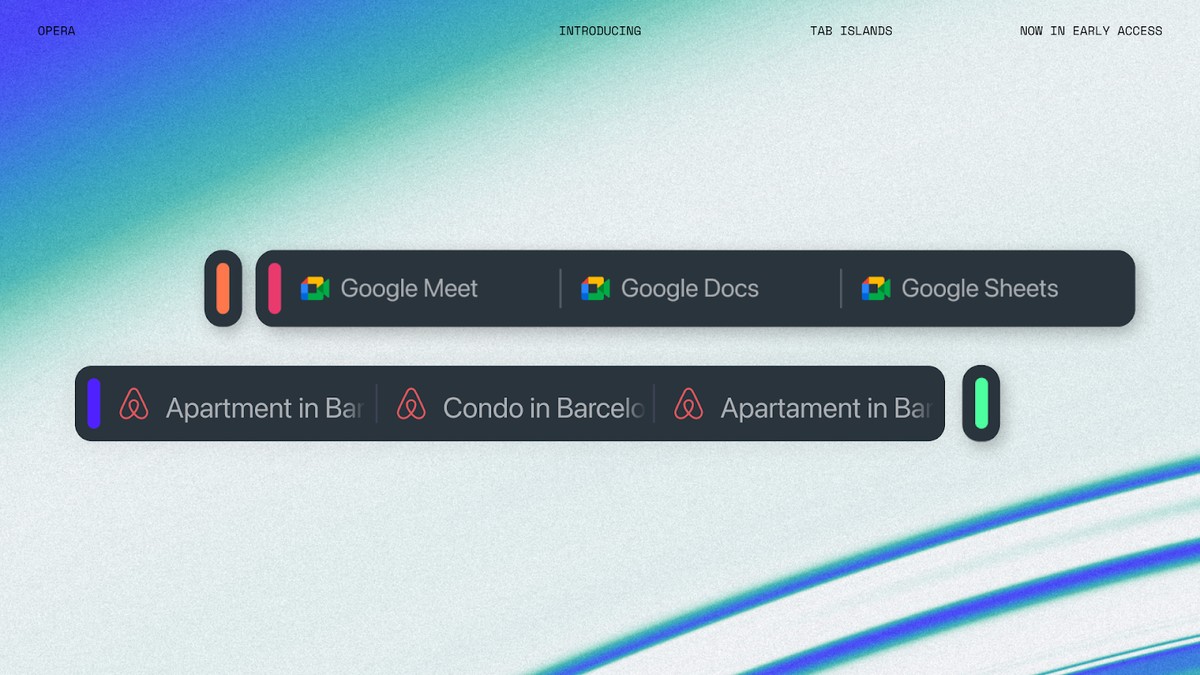
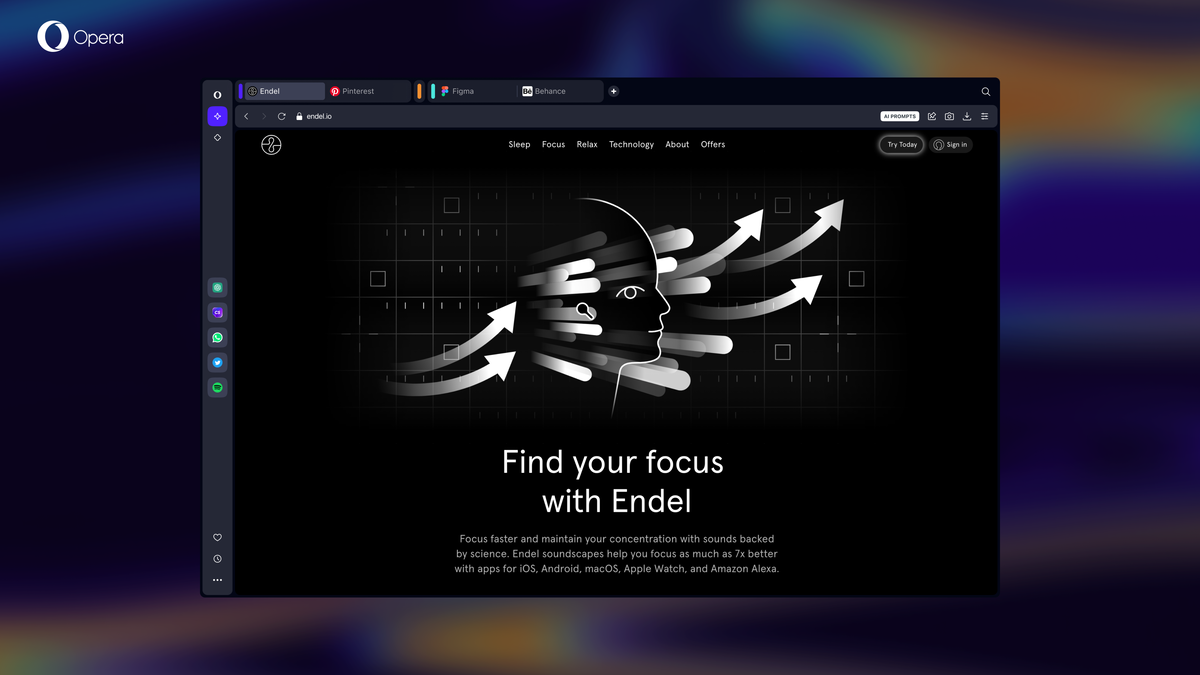











Generally something i found out, is,
check the Colourdeeps your Monitor/s run at. my NEC and Lenovo run only at 8 Bits, soooooo,
i changed running Games to that in Compatibility Mode and run Browsers at 16 bit, what do i see?
No more Crashes or often Disconnects To games, hmmm, seems to be a way to fix Crashes or Disconnects.
Never thought of that, but seems to be a Fix for general Problems with Games and Browsers.
State is: win 10 Pro, Old Hp Computer with Dualcore and Geforce 9400 Gt Graphicscard on 2 Gb RAM with Swap done to 6000 MB.
Runs now like it should^^
I use the most recent stable version of Opera on macOS (10.13 and 10.14) and I have zero issues with ads on my search engine results because I use duckduckgo.com with ads turned off — my choice, done so in settings. I seldom use Google or any other search engine. Give it a try! :)
Even with this “fix” still doesn’t work. That’s why I uninstalled Opera. It’s to be expected. A Chinese company bought Opera and they won’t let their own browser blocking Baidu’s ads.
…as always it is entertaining to see how little civic society has a say in liberalised so called markets. All this is far away from concepts such as one head equals one voice. Instead what we all get here is, one Euro equals one voice… the leaders of most of this anti transparent anti social behaviour are seeing each other these days in the Swiss mountains… best would be, IMHO a non neoliberal state who understands how to regulate the owners of capital
Totalitarian Communist China and the US defense industry are Google’s best friends. Says a lot about Google.
Opera. Once my very favourite. These days I wouldn’t touch it.
Opera? That browser with an ugly hardcoded theme? No thanks.
Might also be worth exploring how far behind an extension like uBlock Origin is in terms of version number when compared to the Chrome version. uBlock on Opera is usually 1-2 versions behind the Chrome web store version with no good reason given by Opera.
Use the chrome store version then, there’s the Opera extension that enables that.
Sure, that’s what I would recommend, but I think it is still worth asking why the Opera store is so much slower at approving updates. I get Opera controls their extensions store tighter than Google, but it is a bit weird uBlock Origin hasn’t been updated on Opera since October 1st.
So they are the first to follow Google Chrome. Interesting times for Adguard desktop and Raspberry Pi plus Pi-hole.
this function has been activated in opera for months now.
Somewhat ironic since Opera is considered one of the best “ad-blockers” on numerous sites. I was going to mention it after reading the article on SmartAdBlocker:
https://www.ghacks.net/2019/01/15/a-first-look-at-smartadblock-for-firefox-and-chrome/
Maybe don’t use an adblocker when Opera is in use?
https://www.techadvisor.co.uk/feature/software/best-ad-blockers-for-2018-3669777/
Not so hard to change a search engine, but I am finding it quite difficult to block the multitude of connections made when accessing one site. Sometimes it’s 30 other domains that are vying for competition.
Odd! Visit four sites but connected with 20; the math doesn’t work for me.
They should concentrate on fixing the neveropenmaximized-bug in linux instead..
That bothered me as well.
You can make a starter like this:
opera %U –start-maximized
True, but not all distros have right-click access to startmenu shortcuts (looking at you Elementary..) so it’s not that easy to do. In fact, having to jump through extra hoops to get something so obvious to work is just annoying. Here’s hoping some Opera developer is reading this: fix your linux version, thank you =) And while you’re at it, make a setting that looks like this: Always launch Opera in private mode. For all platforms. Other than that, I’m very pleased with Opera. The battery saving function works great, Chrome addons as well, the built-in adblock is a brilliant move etc etc.. I don’t miss Chrome, the bullying resource behemoth, one bit.
@ user17843 ,
Simple: market share = $$$
Half the problem is the urge to update software all the time. I’m staying with FF ESR 5.2.9.0 for as long as I can because extensions. MS Office UI change from 2003 to 2007 versions was a horrible downgrade step, IMO. It wasn’t necessary, it was just different. Did XTGold keep updating it’s UI? No. It worked.
Old news – https://www.reddit.com/r/uBlockOrigin/comments/a147uc/psa_if_youre_using_opera_and_wondering_why_the/
Why bring it up now ?
Because this is a news site? Because not everyone use Opera? Because not everyone use Reddit?
You have the power to uninstall Opera.
> The deal is probably the core reason why Mozilla or Opera have not integrated or enabled a full content blocker in their browsers.
*”not yet in all their browsers”. Firefox Focus 9.0 will have a new adblocking feature.
I read about that. It is a good decision, but its market share is negligible.
Adblockers seem to be under attack. First the change in Chrome’s Extension Manifest, now this.
Opera, stop it. Users will switch to other browsers if you don’t.
Strictly speaking, why would it matter to opera if non-paying users leave?
Primary ads are not the only way that users ‘pay’. Everything about the results returned by those engines is tuned to making their income. The order they’re returned, the amount of time people spend on the page, the other services used, and even branding they are exposed to after adblockers is still bringing in revenue. A full non-blocked ad set is just the icing on the cake, not the cake itself.
@daveb/gazoo
Opera tried for years to get away from search engine deals, and all they could do was getting search engine money down to around 65-70% of their revenue.
So yes, they make money with the start pages and amazon, etc., but people who install content blockers also tend to change their settings.
Basically the more passive a user, the more money.
Nothing at a google search result gives google money, except the ads. When a user registers for a nother service, it also doesn’t make google money. Only ads make money for google.
@user17843: “Strictly speaking, why would it matter to opera if non-paying users leave?”
Don’t most browsers (example, the nearly countless browsers on Android) embed affiliate links when accessing certain sites? Even most of the new search engines that are popping up do the same or similar (I always believed).
So if you search for a product and click on Amazon: an affiliate link is added to the cookie file. No longer an Opera user (since the switch in engines and buyout) but they certainly must embed “partnership” details on many sites. They also, if I recall, had a home page that was pre-populated with links to sites. I always assumed that (some) companies paid to get listed there.
It’s why the numbers always matter (paying or “non-paying”). Youtube values non-paying customers because eyes=advertiser dollars. Every product associated with advertising values this number (most of whom are non-paying users).
@user17843
you have to pay for opera?
@All
Only users who don’t use ad blockers and click on ads bring in money for browser.
Users who install content blockers are a financial burden for browser makers.
I almost feel silly pointing this out, because it should be obvious: the deals Opera makes with search engine providers are based on the number of users that Opera can deliver. The fewer the users, the less the money.
Hey Google we have 10 users and would like you to support us financially.
Opera also makes a lot of their cash from promoted Speed Dial suggestions. Having less users of the browser, means they would have less advertisers interested in being paced on their Speed Dial page.
I actually don’t have a huge problem with this since like the Speed Dial ads you can opt in/out. That being said, being so secretive about it and not giving users a heads up is dirty pool IMO.
Exactly. It won’t.
It’s pretty obvious that the fewer users they have the less they’ll be paid by search engines to be included in their locked down list.
Opera loses brand recognition and people recommending it. Step by step, this can sink a company.
Still, I agree with you of course that the paying users are more important to them.
Opera’s becoming worse and worse. There used to be a workaround so you could add a default search engine that wasn’t on their paid for list, they blocked that. Now this as a default. It’s not as though it really has much that makes it unique either, really don’t understand why it’s so popular.
None of the major browsers care about the customer they just pretend to, you have to look at the smaller players for that.
Agreed. Opera 58 now crashes when you try to access settings. Deleted and reinstalled. No more. Bye, Opera.
If you’re not paying, you’re not customer, you’re the product
@Anonymous: “If you’re not paying, you’re not customer, you’re the product”
fyi: Even if you are paying, you are still the product.
The above, often-used, quote has not applied to the tech sector for many years now. They all track, harvest data, share data, surveil and spy regardless of upfront payment, ongoing subscription payments.
@gazoo
Sorry I need to rephrase that. If you’re not purchasing or buying anything, you’re the user. Why tracking is bad thing? I prefer getting ads of products I might be interested than unrelated products at all. Unless you’re browsing questionable things, there’s no fear about being tracked. I really don’t understand why tracking=make you a product.
@ Anon
Come on!
Tracking is bad because it is done without the explicit consent of the user. There was a recent survey saying that something like 75% of FB users did not know that FB made in-depth profiles of them.
The overwhelming majority of users have no idea about implications of what “big tech” is doing. And the people running those organization are incapable of moral behavior. They will justify any and all actions as long as it fulfills their needs and the risk management profile if acceptable.
@anon
Read this comment
https://gizmodo.com/1832163539
What are those ‘implications’? I still don’t understand.
These days that’s only a part truth. Now even if you’re paying you’re the product to many.
@crambie
Product to many? Any detailed explanation?
This isn’t Opera for really long time; the original Opera died the moment they decided abandoning Presto in favor of Blink. The current company using that name and the browser product are Chinese plugs for Western market using the brand which was recognizable for years.
They care about their customers. The search engines are their customers.
Anyway, I think it shows that the desktop market is getting increasingly saturated and hostile for companies to operate in. Desktop users just don’t buy enough stuff.
Basically google is keeping the lights on everywhere.
And there will be a saturation point when it will become better for google to stop paying all competition, and I bet google is already pushing prices down significantly.
@user17843
This is a lie. I posted a problem on the forums and they didn’t respond to me for months and are yet to respond. Their browser is garbage Chrome fork and they are a garbage company owned by the Chinese.
Vivaldi is no better either, they are so full of themselves that they believe in their self-righteous cause and like they’re actually contributing to something, but in reality they aren’t doing shit.